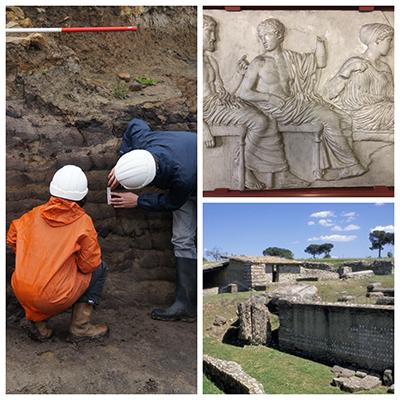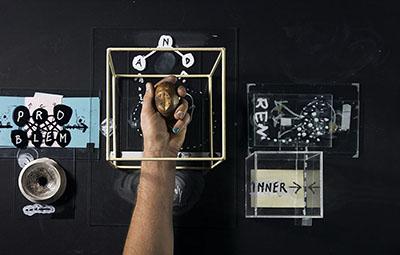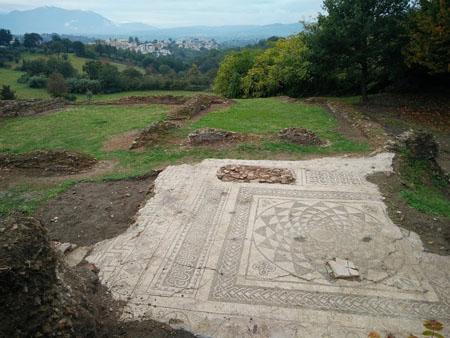Classics REF results
The results of the Classics submissions for REF 2021 indicate a subject expanding in partnership and shaping future academic careers.

Classics at Edinburgh - Shaping the future by exploring the ancient past
The Research Excellence Framework (REF2021) affirms the commitment of Edinburgh’s Classicists to enable brilliant and innovative scholarship and to push beyond the conventional boundaries of the subject.
The results of REF21 reflect a period in which Classics at Edinburgh has flourished and expanded.
Between 2014 and 2020, we won £6.1 million in research grants – twelve times more than that in the last period of assessment. We created nine new permanent posts, hosted 18 postdoctoral research fellows, and awarded 73 PhDs. Our ranking as 3rd in the UK according to THE Research Power rank reflects the breadth and high quality of research we do.
Our research covers all major areas of the discipline: Greek and Latin literature and thought, ancient history, classical art and archaeology. It is outward-looking research that often pushes beyond the conventional methods and canonical frontiers of the discipline. Much of our expansion has been in the field of late Roman and Byzantine studies, where we play a major role in the newly founded Centre for Late Antique, Islamic, and Byzantine Studies. Alongside 33 researchers from the Department of Classics, eight colleagues from the Department of Archaeology were also part of the Classics Unit of Assessment and are included in the REF2021 results – a fact that reflects the long tradition of shared interests and collaboration between the two departments within the same School.
The Department’s success with research grants enables brilliant and original scholarship in new areas, but success is not just valuable for the sake of the research itself. It has also helped to launch brilliant young scholars on their careers through postdoctoral fellowships or replacement teaching positions. And the new permanent appointments we have made have enabled our teaching to diversify in new and exciting directions. With the establishment in 2015 of the A.G. Leventis Chair of Byzantine Studies, and a further new appointment in medieval Latin, Edinburgh is the only Classics department in the United Kingdom to have staff in both Greek and Latin of the Middle Ages. They teach not only the literature of the period but also courses on palaeography and manuscripts that include practical work with manuscripts from the Library collections. New lectureships in Byzantine history and late antique archaeology mean that our ancient history and classical archaeology students can study the whole history of the medieval Roman Empire and explore the transformation of ancient city life down to the advent of Islam.
The success of Edinburgh classicists in REF2021 confirms the originality, significance, and impact of our research.
Just three examples include the Honour in Classical Greece project, funded by the European Research Council, which looks at canonical authors such as Plato, Aristotle, and the tragedians with groundbreaking new methods. The PAIXUE project, also funded by the European Research Council, offers an innovative comparison of classical learning in its social and cultural context in Byzantium and medieval China.
In the Earthen Empire project, classical archaeologists with interests in construction materials and architecture collaborate with colleagues from Edinburgh’s School of Engineering to explore the use of earth and turf in buildings in the north-western provinces of the Roman Empire, including Britain.
Classics at Edinburgh has created a unique learning environment, one that is looking to the future in all aspects.
Find out more about two more research projects within Classics.
Introducing Distributed Cognition to New Audiences

Professor Douglas Cairns - Professor of Classics and Dr Miranda Anderson - Research Fellow
The impact of the research
Collaborative research projects by Dr Miranda Anderson and Professor Douglas Cairns have shown how ideas about distributed cognition help us understand contemporary and historical societies. The research projects highlight the vital roles cultural, scientific, and technological resources and environments play in our capacity to achieve new levels and modes of knowledge that are otherwise beyond our comprehension.
In collaboration with the National Museums of Scotland and the Talbot Rice Gallery, this pioneering research has influenced the thinking of artists and gallery and museum curators, shifted public perceptions of historical artefacts and contemporary artworks, and engaged new and diverse audiences, from schoolchildren to marginalised groups (including people affected by homelessness and economic or educational deprivation).
Watch videos or listen to podcasts about 'The Extended Mind' exhibition here:
Watch videos about recent ideas about Distributed Cognition by leading philosophers and the 'Thinking with Things' Lecture series here:
Find out more about the History of Distributed Cognition Project (HDC) here:
History of Distributed Cognition Project
More on Professor Douglas Cairns
More on Dr Miranda Anderson
Public Archaeology and Community Engagement at Roman Aeclanum

Dr Ben Russell - Senior Lecturer Classical Archaeology
The impact of the research
Dr Russell's work at the Roman city of Aeclanum (Mirabella Eclano, Italy) – through engagement with schoolchildren and garnering media attention, which has boosted visitor numbers – has contributed to the preservation of tangible cultural heritage and enhanced local engagement with the site. It has also helped secure funding for the construction of a new museum there at a time when other sites are under threat due to lack of funding.
Excavations at Aeclanum
PrimaTivvu
Hundreds of children to discover how the ancient Romans lived
Archaeokids
Engaging with children at Aeclanum
Illustrating Ancient History. Bringing the Past to the Present
Artwork by Zofia Guertin from Aeclanum
More on Dr Ben Russell

